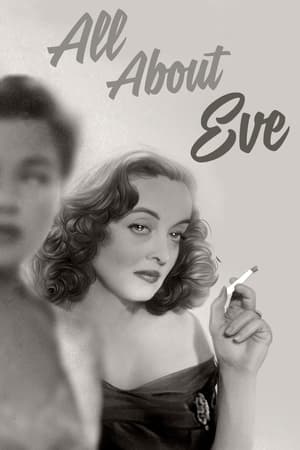
All About Eve
**Fasten your seat belts: this is one of the best films of the 20th century.** There aren't many perfect movies: At least, I don't know many. However, this film is almost certainly one of them. The result of an ideal combination of factors, which harmoniously came together to make it a work of art, it is a timeless film that is as pleasantly watched today as it was fifty years ago. But when we talk about classic films, it's far from being one of the first to come to mind. What is the reason? It's hard to explain, but I feel like the film never really touched the hearts of the general public. The film deserves more attention these days and is worth seeing. I'm not one of those who measure the quality of a film by the awards it receives (although that is always an indicant to consider as to quality)... but the film is one of the most nominated for the Oscars, with fourteen nominations, something that has only rarely been equaled, and six statuettes won, including Best Picture. The film begins by showing us a ceremony in which an actress, Eve, receives an important award for her performance in the theater. Then, the action goes back a year to, in flashback, let us know everything that happened until that moment. And that's how we follow the rise of Eve, an aspiring actress from obscure origins who manages to arouse the pity and sympathy of Margo Channing, then the biggest star of the stages. The film explores the two characters well, and the way they relate to each other. Eve is quite ambiguous for part of the movie, and even after we see the darker side of the character. Margo seems like a very insufferable shrew, but the character has a good heart, hidden under tons of ego and big theater diva tics. Based on a short story and intelligently developed by Joseph Mankiewicz, the director who will ensure the script, the film has an excellent cast and memorable dialogues, full of quotable phrases that we've probably heard somewhere. The cast is powerfully led by Bette Davis, an extremely talented, charismatic and full of personality actress who gave her all in this film, managing to achieve here, in my perspective, her work of glory. The difference between Margo, the character, and Davis, the real person, is so thin that you can almost say that the actress has taken the character and brought it a little bit into her own life. It's a truly superb dramatic exercise, and the same applies to the one given to us by its co-star, Anne Baxter, who plays Eve. The way they both collaborate in their scenes is mesmerizing. I also really liked Celeste Holm, George Sanders and Hugh Marlowe, even though the men in this cast aren't as strong as their female counterparts. Being a black and white film, this might be a bit off-putting to current audiences, but it's not something I see as a problem. On the contrary, I really liked the cinematography and I think the film has a lot of elegance and visual beauty. There are some scenes and camera movements that I found strange, but I think some are really unusual in films from this era. As for the costumes, I really liked the way they fit the story, and some of the actresses' costumes and dresses are pieces worthy of haute couture. The film has some implicit humor, which can escape the most inattentive, like that piano piece that Davis, intoxicated, listens to several times, later calling it “cheap sentimentality”.
